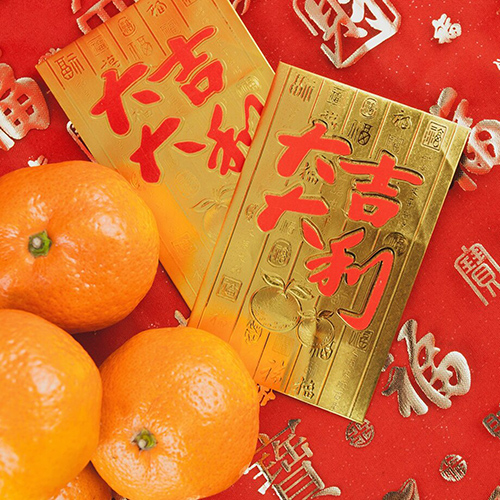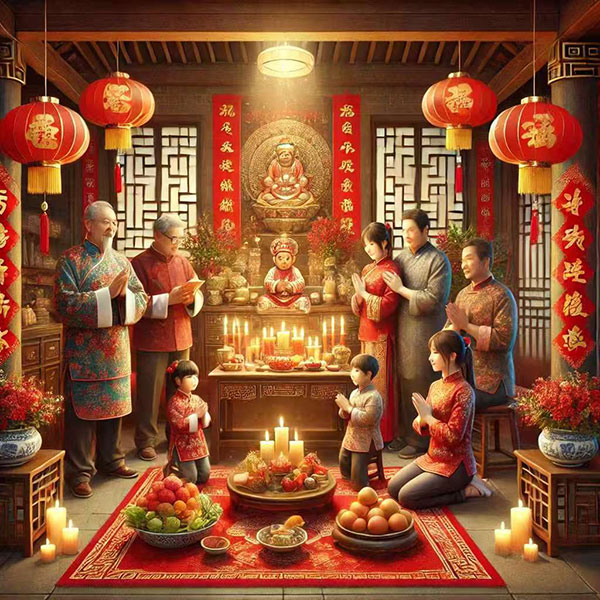Celebrating the Arrival of the Kitchen God: A Tradition of Chinese Culture and Confidence
迎接灶神的到来:中国文化与自信的传承
As the Chinese New Year festivities continue, the Fourth Day of the Lunar New Year holds a special significance: it is the day to welcome the Kitchen God, a cherished figure in Chinese households. This ancient tradition, which has been passed down for over a thousand years, is not just a simple folk custom but a profound reflection of the values, culture, and beliefs of the Chinese people.
随着春节的热烈庆祝持续进行,农历新年的第四天具有特别的意义:这是迎接灶神的日子。这个已经传承了千年的古老传统,不仅仅是一项简单的民俗,更是中国人民文化、价值观和信仰的深刻体现。
The Kitchen God, or “Zao Jun” in Chinese, is considered the protector of the household. Traditionally, he resides in the kitchen, overseeing the family’s well-being, ensuring prosperity, and safeguarding the health and happiness of everyone. According to folklore, the Kitchen God ascends to Heaven at the end of the year to report on the family’s actions. Before his departure, families offer sacrifices, praying for blessings in the year ahead and hoping for a good report. On the Fourth Day of the Lunar New Year, families welcome his return, inviting him back to ensure peace and prosperity.
灶神,也被称为“灶君”,在中国家庭中被视为家宅的守护神。传统上,灶神居住在厨房,负责监督家庭的福祉,确保家人的繁荣与健康幸福。根据民间传说,灶神每年年底会升天,向天帝报告家庭的善恶。在离开之前,家庭会向他献祭,祈求新的一年里能够得到庇佑与吉祥。在农历新年的第四天,家家户户会迎接灶神的回归,希望他再次降临,确保家庭的和睦与富贵。
This beautiful custom, rich in meaning, is more than just a ritual—it embodies the essence of Chinese cultural values. It emphasizes respect for ancestors, reverence for tradition, and the belief in harmony between man and nature. Each action, from cleaning the kitchen to offering incense and food to the Kitchen God, symbolizes a deep connection to one’s heritage and the importance of family unity. The story of the Kitchen God reflects the wisdom of ancient Chinese culture, where the family is seen as the cornerstone of society, and good fortune is believed to come from a balanced and harmonious home.
这一美丽的习俗,富含深刻的文化意义,不仅仅是一项仪式,它展现了中国文化的核心价值观。它强调对祖先的尊敬、对传统的传承以及人与自然和谐相处的信仰。从清洁厨房到为灶神奉献香火和食物,每一个环节都象征着人们与祖先文化的深刻联系,以及家庭团结的重要性。灶神的故事体现了中国古代文化的智慧,其中家庭被视为社会的基石,幸福和好运来自于一个平衡和谐的家庭。

In recent years, as China continues to modernize and evolve, there has been a renewed focus on preserving and promoting traditional customs like this one. Amid rapid urbanization and globalization, the younger generation is rediscovering the richness of their cultural roots and embracing traditions that celebrate Chinese identity. The celebration of the Kitchen God is a perfect example of how traditional beliefs can coexist with contemporary life, offering a bridge between past and present.
近年来,随着中国社会的现代化发展,越来越多的人开始重新关注和弘扬这些传统习俗。在快速的城市化和全球化进程中,年轻一代正在重新发现自己文化的丰富内涵,并积极接纳那些能够彰显中国身份的传统。迎接灶神的庆祝活动便是这种现象的体现,它证明了传统信仰如何在现代生活中依然焕发光彩,成为连接过去与现在的一座桥梁。
Marketing this tradition in today’s world is not just about selling products; it’s about conveying a story—one of culture, heritage, and national pride. The Chinese people are increasingly embracing their cultural confidence, and there is a growing demand for products that reflect this spirit. From beautifully crafted home decorations to gifts that symbolize blessings and good fortune, there is a market for items that honor the traditions of the Kitchen God and other Chinese deities.
在当今社会,营销这一传统不仅仅是销售产品,更是传递一种故事——一个关于文化、遗产和国家自信的故事。中国人民正日益增强文化自信,越来越多的人渴望通过庆祝传统来表达这种自信。从精美的家居饰品到象征祝福和好运的礼物,市场上有着越来越多能够体现灶神等中国神明传统的商品。
For businesses, understanding the emotional connection people have with these traditions is key. For instance, the Kitchen God is not just a symbol of good fortune but a reminder of the values that bind families together. Products that align with these values—such as home decorations, religious items, or festive foods—are not just products but symbols of shared beliefs and cultural pride. The story of the Kitchen God offers a perfect backdrop for marketing campaigns that emphasize family unity, cultural appreciation, and a hopeful outlook for the future.
对于商家来说,了解消费者与这些传统之间的情感纽带至关重要。例如,灶神不仅是好运的象征,更是家庭团结的象征。那些契合这些价值观的产品——如家居装饰、宗教用品或节令食品——不仅仅是商品,它们还是共享信仰与文化自豪感的象征。灶神的故事为营销活动提供了一个完美的背景,能够强调家庭团结、文化传承和对未来的美好期望。
The Fourth Day of the Lunar New Year, when the Kitchen God returns to his earthly home, is more than just a day of rituals—it’s a celebration of family, culture, and the enduring strength of Chinese heritage. As we continue to embrace these traditions in the modern world, let us also take pride in the stories we tell and the cultural confidence we share. By promoting these traditions, we contribute to the preservation and evolution of Chinese culture, ensuring that its values continue to shine for generations to come.
农历新年的第四天,灶神回归人间,这不仅仅是一次祭祀活动,它是对家庭、文化和中国传统韧性的庆祝。在我们继续在现代世界中拥抱这些传统的同时,也让我们为能够讲述这些故事、传播这种文化自信而感到骄傲。通过推广这些传统,我们不仅能帮助保存中国文化,还能确保其价值观能够传承千年,影响更多的世代。
In this era of rapid change, it’s important to hold on to the roots that make us who we are. The story of the Kitchen God is a perfect reminder that no matter how much the world around us evolves, the essence of our culture remains timeless. As we welcome him back each year, let us also welcome the opportunity to share these traditions with the world and continue to build a strong, confident, and unified China.
在这个快速变化的时代,我们更需要坚持那些塑造我们身份的根基。灶神的故事正是一个完美的提醒:无论世界如何变化,我们文化的精髓依然是永恒的。当我们每年迎接灶神的到来时,我们也在迎接将这些传统与世界分享的机会,并继续建设一个强大、自信、团结的中国。



